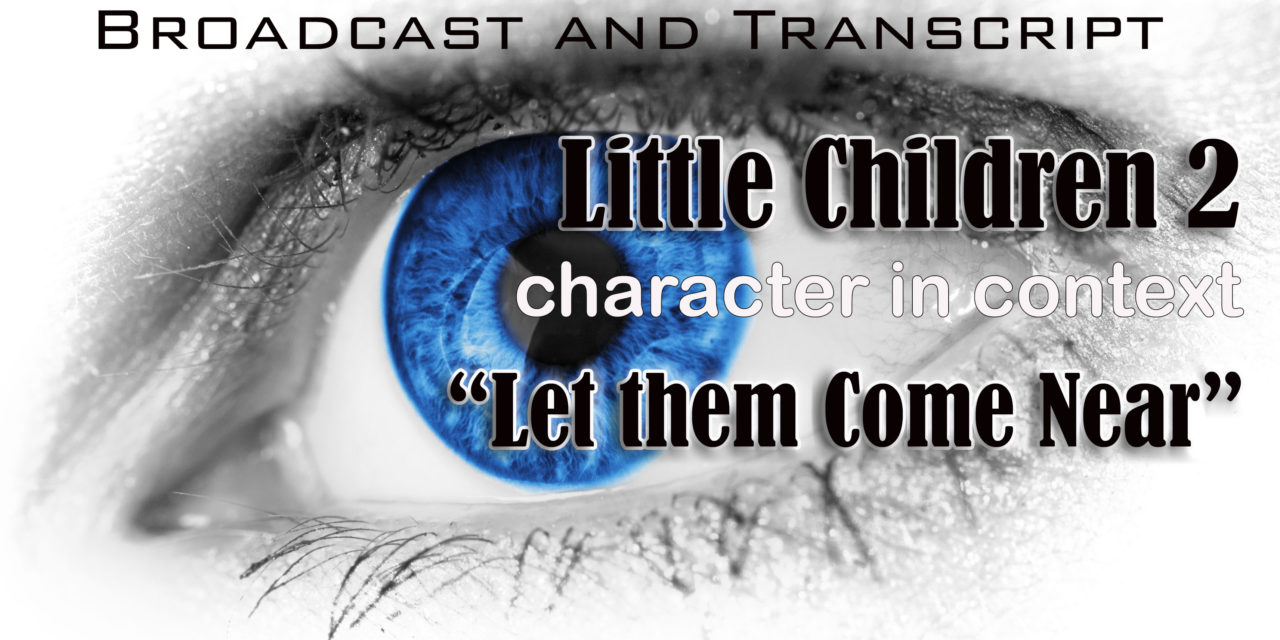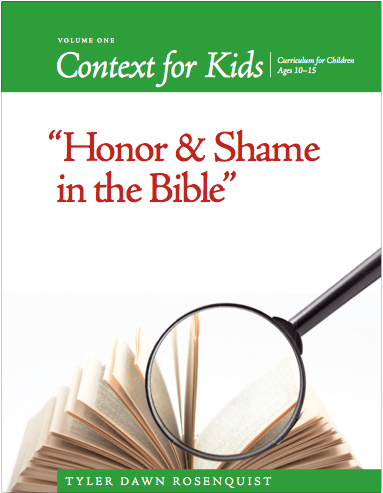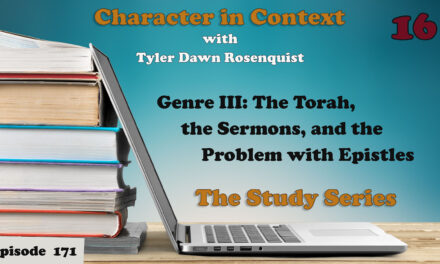Last week I taught about the low status of children in the ancient world, and how the perception of them differed from our idealized “Leave it to Beaver” views of children and childhood. This week is much darker. Why would the disciples have been eager to get little children and infants away from Yeshua/Jesus? We might find our answers in the Roman era statistical data on the severely high infant and child mortality rates–as well as those for adults.
More episodes are available at CharacterinContext.podbean.com
Transcript–forgive any glaring errors
Hi, this is Tyler Dawn Rosenquist and welcome to Character in Context, where we explore Scripture in its original historical context and talk about how God is communicating His expectations to us as His image-bearers—Because, after all, if all this information doesn’t bring us closer to God’s character, it’s just useless brain candy..
You can catch my blogs at www.theancient bridge.com and my children’s context teachings at contextforkids.com. I also have two youtube channels where you can listen to the archives of past Character in Context broadcasts as well as watch my video teachings for adults and kids, which can be accessed through my websites, as can my books and my family curriculum series.
And remember my weekly disclaimer—scholars are an important part of the Kingdom, but the Kingdom is bigger than scholarship. We need all sorts of servants, and we need to give them the respect they are owed according to the area in which they have expertise—whether that is in working with the homeless, in the missions field, getting justice for the oppressed, in their field of bible study, etc.
Anyone who is functioning in their calling and devoting their life to God is worthy of our respect, whether we agree with them 100% on this and that or not.
This week is part 2 of our reality check into what it meant to be a child in the ancient world, as opposed to how things are now. We will be looking into the terrible reality of child mortality and why the disciples were probably so intent on keeping the children away from their teacher.
Let’s take a second look at the different NT passages related to children
Luke 18:15-17 15 Now they were bringing even infants to him that he might touch them. And when the disciples saw it, they rebuked them. 16 But Jesus called them to him, saying, “Let the children come to me, and do not hinder them, for to such belongs the kingdom of God. 17 Truly, I say to you, whoever does not receive the kingdom of God like a child shall not enter it.”
(^^right after tax collector parable—whoever exalts himself….)
Matt 18 At that time the disciples came to Jesus, saying, “Who is the greatest in the kingdom of heaven?” 2 And calling to him a child, he put him in the midst of them 3 and said, “Truly, I say to you, unless you turn and become like children, you will never enter the kingdom of heaven.4 Whoever humbles himself like this child is the greatest in the kingdom of heaven. 5 “Whoever receives one such child in my name receives me, 6 but whoever causes one of these little ones who believe in me to sin, it would be better for him to have a great millstone fastened around his neck and to be drowned in the depth of the sea.
Matt 19 13 Then children were brought to him that he might lay his hands on them and pray. The disciples rebuked the people, 14 but Jesus said, “Let the little children come to me and do not hinder them, for to such belongs the kingdom of heaven.” 15 And he laid his hands on them and went away.
Mark 10 13 And they were bringing children to him that he might touch them, and the disciples rebuked them. 14 But when Jesus saw it, he was indignant and said to them, “Let the children come to me; do not hinder them, for to such belongs the kingdom of God. 15 Truly, I say to you, whoever does not receive the kingdom of God like a child shall not enter it.” 16 And he took them in his arms and blessed them, laying his hands on them.
Last week we investigated how children had little to no honor or place in society in the ancient world, and how children were not viewed through the modern idealistic lenses of innocence, honesty, and trusting nature but instead were seen as nobodies, and fools who needed to be disciplined into wisdom.
This week we are going to talk about one of the main reasons why children had no status in the ancient world—namely, the unlikeliness of their ever even reaching adulthood.
I will be citing from the excellent article by Richard Rohrbaugh named The Social Location of the Markan Audience, from the larger collection The Social World of the New Testament edited by Jerome Neyrey and Eric Stewart. I have to say that Neyrey is an incredible scholar, one of my favorites—his book Honor and Shame in the gospel of Matthew is a masterpiece. Rohrbaugh, who wrote the article I will be citing, is also very good.
In the section on Peasant health (meaning the health of the non-elites), Rohrbaugh says this—and I am not usually going to read a whole section of a book, but this data is just so contrary to the scenes we see in Bible movies that I want you to get the whole picture. Pg. 154
Summary, as it is illegal to copy that much of a book:
Birthrate 1st century twice that of modern US, 40 births per thousand, per year
30% of infants died in the first year
Children were first to suffer from malnutrition, disease and poverty. Those who did make it to adulthood generally had at least one parent dead.
60% of those who survived their first year of life were dead by age 16.
By age 30, among the poor who made up most of the population, people were riddled with parasites, had rotting teeth, and we suffering from severe protein deficiency.
50% of the combs from Masada, Qumran, and Murrabat were infected with lice eggs.
Skeletons recovered from digs in that era show severe malnutrition.
Infectious disease was rampant and most could not afford any kind of medical care when it was even available. Folk healers and exorcists were the norms, as they attributed most illnesses to demons.
Poor housing, nonexistent sanitation, violence, economically inaccessible health care all added up to early death.
¼ of the male’s caloric intake would come from alcohol
**********
The citation about the wine intake from Broshi (Bread, Wine, Walls and Scrolls) might sound shocking, but he is actually an expert in the history of Roman-occupied Palestine and is deeply involved with digs of cemeteries and such in the Qumran area. Really, however, this is not all that shocking and we shouldn’t think of people walking around drunk. Based upon a 2500 calorie diet, it would only require 600 calories from alcohol, which really isn’t that much alcohol and would be par for peasant societies throughout history. A Roman soldier or slave, for example, was rationed a liter of wine a day. It isn’t that much different than the alcohol consumption in England just a couple of centuries ago when the only safe liquid to drink for the lower class was beer or gin. And that includes kids.
It was survival, and not health, that was the immediate concern of ancient people. We are health-crazed nowadays and so we tend to have a pie in the sky attitude about their GMO-free, pesticide-free, totally organic diet, but the research paints a very different picture. Malnutrition, protein deficiency, alcohol consumption, lack of medical care for all but the wealthy, inadequate medical care for the wealthy largely based upon superstition and even magic, parasites, lice, infectious diseases all contributed to a low life expectancy and a rather poor quality of life in general in the first century Roman Empire. Cemeteries in Israel tell the same story as cemeteries elsewhere in the Empire, and in Palestine, unlike other Roman areas, was rife with violent activity.
I had a few people pose some questions when I posted the statistics on social media. “How did they go from living hundreds of years to living an average of thirty?” (Note that this doesn’t mean that half of the people made it to 30 and half didn’t). In the table above, we see that once you reach your twenties, it is possible to live quite a while longer. But the quality of life wasn’t stellar.
1. Farmers losing their land and falling into severe debt and hunger. The presence of God was never in the Land during the second Temple period.
- An increase in diseases, as has been the pattern since the beginning.
- Poor sanitation as people moved from private holdings to cities, leading to an increase in infectious diseases.
- Violence and repeated rebellion and uprisings among the Jews met with crushing retaliation by Rome.
- Severe taxation leading to terrible poverty
- Consistent consumption of alcohol.
- A lack of any sort of regulated or widely available healthcare system. Literally, if you were poor, all you had was your immune system which, in a world full of parasites and lice, could be easily compromised in children, and especially infants.The days of Moses, Joshua, and the monarchy where everyone sat under their own vine and fig tree were long since past. It was a very dangerous and difficult time to be alive.
So, all that said, why on earth would these mothers take their children out to see Yeshua, risking infection and even risking their own reputations because women were not to be out without male escorts? Desperation is my guess. I would have to believe that these were the mothers of sick children who were doing whatever it took to get them touched by this miracle healer from Galilee. If so, then this is a heartbreaking scene, which makes it even harder to imagine why the disciples would so callously drive them away.
Well, that part isn’t so hard to explain as we might think. Yeshua, past 30, was an elder in the community. His mother was probably at least 45 years old. In a time and place like that, the last thing anyone wants to be around was sick kids. In those times, they were instead written off—the family’s problem and not societies. It really says something about these ancient moms, if I am right, in that they tried to get help from their kids anyway. But we can also see why the largely probably teenage disciples didn’t want the sick kids around either. Most people were dead by 16 years of age. They could be next, and their beloved teacher was practically an old geezer in their eyes. Think of Messiah being more like fifty than thirty, and that’s probably not too far off.
They didn’t want Yeshua to die just because these women were bringing lost causes to Him. Let’s look at those passages again:
Matt 19 13 Then children were brought to him that he might lay his hands on them and pray. The disciples rebuked the people,14 but Jesus said, “Let the little children come to me and do not hinder them, for to such belongs the kingdom of heaven.”15 And he laid his hands on them and went away.
Mark 10 13 And they were bringing children to him that he might touch them, and the disciples rebuked them. 14 But when Jesus saw it, he was indignant and said to them, “Let the children come to me; do not hinder them, for to such belongs the kingdom of God. 15 Truly, I say to you, whoever does not receive the kingdom of God like a child shall not enter it.” 16 And he took them in his arms and blessed them, laying his hands on them.
And He rebuked them. “Hey you guys, don’t you realize that this is exactly why I came??? The Kingdom I am preaching and healing in the Name of, it’s for the benefit of the sick and vulnerable—not for those who think they have no need of me, and who is more vulnerable and needy than these little ones?”
If there was a TDR paraphrase of the Bible, this might read, “Seriously, put on your big girl panties and cope with the fact that I am here to heal the sick, not to put them in a corner and wait for the little rugrats to die.”
*************************
The phrase Kingdom of Heaven is much misunderstood. It doesn’t mean Heaven as a separate destination where we are all going and completely separate from the earth. No, when Yeshua talked about the Kingdom of Heaven/God it was with respect to it infiltrating the Kingdoms of the earth. One of these days we will look at all the “Kingdom of heaven is like” references but for now we are just going to refer to it as an invasion of the temporal by the divine. Every time Yeshua healed someone, or preached, or delivered someone, the will of God was being done on earth –Heaven was invading earth. The same thing happens with each new believer.
Especially in the gospel of Mark, the preaching of the Kingdom is coupled with healings, deliverances, resurrections, and restoration of some kind or another. In fact, ancient medicine wasn’t so much focused on curing a person, but on restoring them to community. For community-minded people, the worst nightmare wasn’t sickness, it was being cut off from the community. The woman with the issue of blood is a great example of a healing that restored the woman to the community. Same with lepers, those who could not see, those who could not walk, and the demon-possessed.
What we don’t see are emotional problems because in dyadic people, who never thought of themselves singly, they weren’t introspective enough to focus on themselves. If the community wanted and accepted them, then they were happy. Contrast this with modern times when we have a ton of physical health (comparatively) and a whole slew of emotional problems.
So, if we were going to take the concept of “toxic” people from the first century to now, we would have to shift our focus from people who are infectious and disease-ridden, to people who are so wounded that they are toxic to themselves and others. We are an incredibly self-focused society bent on feeling good about ourselves and being loved and treated fairly, and when that doesn’t happen, we often carry a lot of baggage. I am not getting judgy here, but there is a real difference between a survival-based society that has to focus on external needs, and a wealthy society based on the satisfaction of wants fed by the unreasonable examples of familial bliss out there on television. We have unreasonable expectations because we have too much time to think about what should have been, what we want and don’t have, and about how other people are annoying us. Of course, people who don’t watch television can be just as bad and worse—our modern society is what it is and we are individuals. It’s good to recognize the pitfalls without catering to them overmuch. Some people are absolutely traumatized, and rightfully so, but most of us are just morbidly disappointed and self-absorbed.
Oftentimes, the people who need us in the Kingdom of Heaven are the most are toxic and sometimes even dangerous to our health. We need to be wise about who we are rejecting, and about the difference between discomfort and danger.
We all want to be around the healthy, the beautiful, the easy, and the whatever isn’t going to be annoying or too much of a bummer. But is what who Yeshua came to save?
Mark 2:17
And when Jesus heard it, he said to them, “Those who are well have no need of a physician, but those who are sick. I came not to call the righteous, but sinners.”
people who seem to have it all together might be more fun to be around, but is that our calling? I would say not.
Now that being said, if you are still in a place where you are very damaged and in triage, so to speak, then in order to grow there are probably people you need to stay away from and/or avoid. There are also people who are just purposefully toxic, and we are not to waste our time on them.
Titus 3 10 As for a person who stirs up division, after warning him once and then twice, have nothing more to do with him, 11 knowing that such a person is warped and sinful; he is self-condemned.
Now that doesn’t mean someone who is new and confused, or who is content to simply disagree peacefully while striving for the unity of the brethren, this means people whose fruit is nothing but division. It’s always their way or the highway, and never over genuine salvation issues but personal agendas. We need to develop wisdom so that we can know the difference and not further damage people who aren’t just difficult, but wounded. The disciples were treating these sick kids, if they were in fact sick, like toxic throwaways. The question is, do we do that same sort of thing? And how petty are our criteria? Hey, the disciples felt justified or else they wouldn’t have done what they did, right?
To sum up Yeshua as the Second Temple healing presence. When we see Yeshua healing the sick and delivering people from demons, we see Him serving the same function as the Tabernacle and Temple. Healing flowed out through Him, which was important given that the healing presence of God never rested upon the Temple or the Land in Second Temple times—except through His Son.
Copyright 2019
Tyler Dawn Rosenquist
Reproduction of this without credit and permission is prohibited.





















